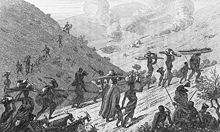Mfengu
The fengu people (also Fengu or Fingo ; plural also amaFengu ) are the Bantu belonging ethnicity in today's South Africa . Originally they were close to the Zulu , but are now mostly counted among the Xhosa , whose language isiXhosa most of them speak. During the border wars , their military skills were important.
They were referred to in English as Fingo, from which the term Fingoland, which was used at times, was derived for the southwest of the former Transkei homeland around Butterworth . Fingoland was located between the Great Kei River and the Bashee River (now Mbhashe). Another historic Mfengu settlement center is Peddie near the Great Fish River .
history
The term amaFengu means "wanderer". They were expelled from the Zulu under Shaka during the Mfecane with other ethnic groups . Most of the Mfengu fled westwards and settled in the Xhosa area in what is now the Eastern Cape Province , including what would later become Fingoland , in the early 1830s . Their traditional structures were destroyed, so that they could more easily be influenced by European ways of thinking than other ethnic groups. So they were the first Nguni to be baptized. In 1835 they were recognized as British citizens and settled under the protection of the British in a buffer zone on the Great Fish River. In the same year they formed an alliance with the British troops of the Cape Colony and won several skirmishes, especially against the Gcaleka belonging to the Xhosa. On May 14, 1836, Mfengu took an oath in Peddie before the missionary Ayliff, according to which they wanted to obey God and the missionaries, be loyal to the government and raise their children in the spirit of the missionaries. For this they were the first to receive Bantu plows and thus could grow wheat. Several educational institutions, such as Lovedale, Healdtown, and St. Matthews, were built for them. During the border wars, the area became part of the British Kaffraria colony .
The Mfengu did not take part in the Xhosa cattle killing around 1857 and so benefited from the weakening of the Xhosa. In 1866, British Kaffraria became part of the Cape Colony. After a long period of peace, the Ninth Border War broke out in 1877 after a stick fight between Mfengu and Gcaleka broke out during a Mfengu wedding celebration. The Cape Colony authorities hired Captain Veldtman Bikitsha of the Mfengu to be a member of the military leadership. The troops, which consisted mainly of Mfengu, Thembu and Buren , defeated the Xhosa within three weeks. The British Governor Henry Bartle Frere then forcibly disarmed the Mfengu, so that they sided with the Xhosa. In 1879, Fingoland was also annexed by the British .
Well-known Mfengu include Veldtman Bikitsha, politician John Tengo Jabavu and his son Davidson Don Tengo Jabavu . Mfengu Emancipation Day was celebrated for the first time on May 14, 1907 and was intended to commemorate the oath of 1836. Similarly, the Xhosa proclaimed Ntsikana Day in 1909 , in memory of the prophet of the same name. In the 20th century there were efforts among the Mfengu to get their own Bantustan . The Bantustan Ciskei , however, was intended for the Mfengu and the western Xhosa. In 1968 Mfengu wrote the Fingo Manifesto under their leader Mabandla , which called for the Mfengu to be recognized as a separate ethnic group. Mabandla was then the chief executive of the Ciskei, but the Xhosa Lennox Sebe won the first elections in 1973 by stirring up resentment against the Mfengu and being supported by the South African government. He managed to fill the key positions with Xhosa, so that finally Mabandla also joined his party Ciskei National Independence Party (CNIP) and this received all seats in the subsequent election. Many mfengu mixed with Xhosa and Zulu, so that there is no longer a designated mfengu population today.
Individual evidence
- ↑ a b entry at britannica.com (English), accessed on September 14, 2013
- ↑ Information on the Mfengu 1835 at sahistory.org.za (English), accessed on September 14, 2013
- ↑ DJ Potgieter and others (ed.): Standard Encyclopaedia of Southern Africa. NASOU, Cape Town 1970, p. 382
- ^ A b c Leroy Vail: The creation of tribalism in Southern Africa. University of California Press, Berkeley 1991, ISBN 0520074203 , p. 399. ( digitized version )
- ^ History of the Ciskei (English), accessed on September 14, 2013



